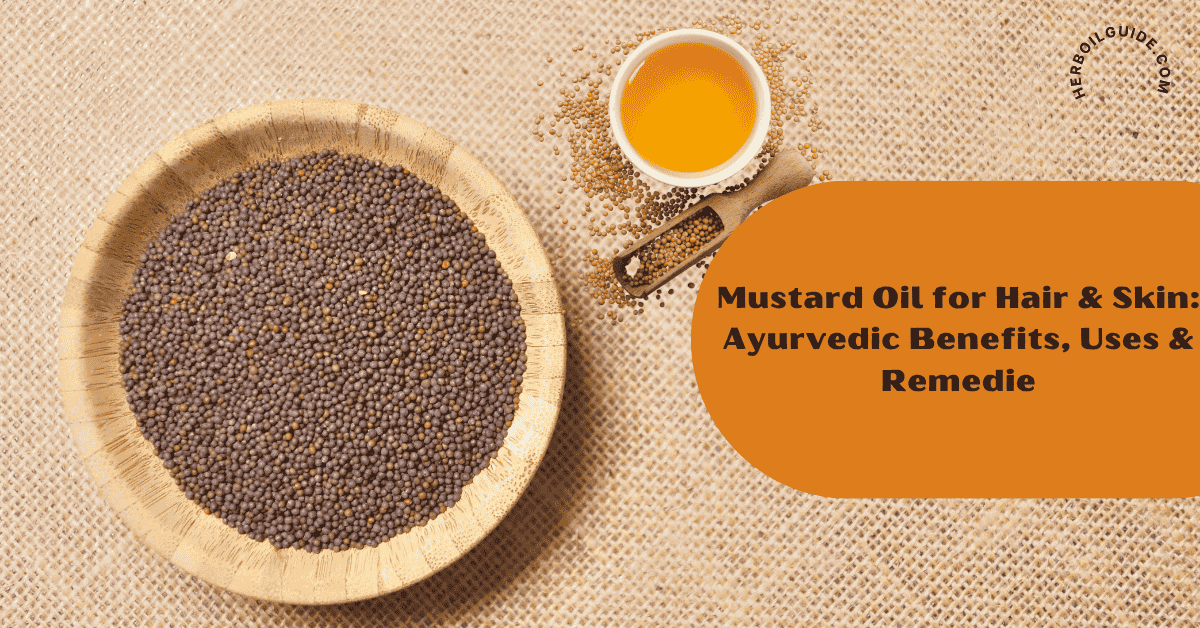Mustard Oil for Hair & Skin: Ayurvedic Benefits, Uses & Remedies

Mustard oil, known as Sarson ka tel in many cultures, has been a cornerstone in Ayurvedic practices for centuries. Its multifaceted benefits for hair and skin have transcended regional boundaries, making it a globally recognized natural remedy. Modern interpretations increasingly validate what Ayurveda has long emphasized: the diverse beauty benefits of mustard seed oil.
Table of Content
1. Mustard Oil in Ayurveda: A Holistic Approach
In Ayurveda, mustard oil is esteemed for its warming and detoxifying properties, beneficial for balancing Vata and Kapha doshas. Rich in omega-3 and omega-6 fatty acids, antioxidants, and allyl isothiocyanate, mustard oil promotes circulation and helps reduce inflammation. This aligns with Ayurvedic principles that value mustard oil as medicine, particularly for skin diseases and scalp infections.
2. Hair Care Benefits of Mustard Oil
1. Promotes Hair Growth and Strengthens Roots
Applying mustard oil to the scalp stimulates blood flow and strengthens hair follicles. This promotes hair growth and helps in reducing hair loss. The oil is rich in omega-3 fatty acids and protein, both essential for scalp nourishment and root health.
- The benefits of mustard oil in hair include increased volume, less breakage, and improved texture.
- Mustard oil and hair growth go hand-in-hand in both Ayurvedic and modern beauty routines.
- Mustard oil with onion and fenugreek seeds for hair growth is a popular home remedy.
2. Combats Dandruff and Scalp Infections
Mustard oil's antibacterial and antifungal properties help relieve scalp infections and dandruff. Mixing mustard oil with lemon juice or yogurt creates effective treatments for scalp health.
- Mustard oil and lemon for hair dandruff can soothe itchiness and balance scalp oils.
- Yogurt and mustard oil for hair makes a nourishing mask to remove flakes and hydrate.
3. Prevents Premature Graying
The high antioxidant levels and vitamin E in mustard oil help retain hair's natural color and delay graying. Using mustard seed oil for premature grey hair is a common Ayurvedic practice.
- Best mustard oil for hair growth often includes ingredients like onion juice, aloe vera, or fenugreek.
- Curd and mustard oil for hair is another traditional solution to hair fall and dullness.
4. Deep Conditioning and Nourishment
Oiling hair with mustard oil provides deep conditioning. It helps tame frizz, adds shine, and reduces breakage. Egg and mustard oil for hair or egg yolk and mustard oil masks deeply condition strands.
- Best way to apply mustard oil on hair is to warm it slightly and massage it into the scalp before leaving it overnight.
- Mixes like mustard oil and aloe vera for hair enhance scalp hydration.
3. Skincare Benefits of Mustard Oil
1. Moisturizes and Hydrates Dry Skin
Mustard oil is beneficial for dry skin due to its rich fatty acid profile. It penetrates deeply, providing moisture and relieving flakiness.
- Is mustard oil good for dry skin? Yes, it’s especially helpful during winter months.
- Applying mustard oil regularly improves skin elasticity and reduces fine lines.
2. Soothes Itchy and Sensitive Skin
Its anti-inflammatory compounds calm irritated skin and prevent rashes.
- Is mustard oil good for itchy skin? Yes, especially when used in a diluted form.
- A small amount goes a long way in relieving sensitivity and redness.
3. Brightens Skin and Reduces Dark Spots
Mustard oil is rich in antioxidants and vitamin E, which brighten the skin and fade dark spots over time.
- Beauty uses for mustard oil include lightening pigmentation and evening out the complexion.
- Best mustard oil for skin should be cold-pressed and organic to avoid impurities.
4. Global Recognition and Usage
Mustard oil is now recognized globally beyond Bangladeshi, Pakistani and Indian cuisines and rituals. Its role in hair care, skin therapy, and natural beauty products is expanding in markets like the United States and Europe.
5. Safety and Precautions
While mustard oil offers numerous advantages, always perform a patch test before full application to avoid allergic reactions. Use only a small amount to start and ensure the product is cosmetic-grade.
6. FAQ Section
Q1. Is mustard oil good for hair?
A1. Yes, mustard oil is highly beneficial for hair due to its rich content of omega-3 fatty acids, antioxidants, and antibacterial properties. It promotes hair growth, prevents hair fall, combats dandruff, and deeply conditions the scalp.
Q2. Can mustard oil be used for hair loss and greying?
A2. Absolutely. Ayurvedic practices often recommend mustard seed oil for premature greying and hair loss due to its high vitamin E and selenium content which help nourish follicles and maintain natural hair color.
Q3. How do I use mustard oil for glowing skin?
A3. Apply a few drops of cold-pressed mustard oil to clean skin, ideally mixed with a carrier like almond oil. Massage gently to moisturize, reduce dark spots, and improve elasticity.
Q4. Is mustard oil safe for facial use?
A4. Yes, but only in small amounts and diluted form. Its anti-inflammatory properties help reduce acne and pigmentation, though a patch test is essential before using it on the face.
Q5. What are some effective mustard oil hair masks?
A5. Popular hair masks include:
- Mustard oil + yogurt (for dandruff)
- Mustard oil + egg yolk (for deep conditioning)
- Mustard oil + onion juice + fenugreek (for hair growth)
Q6. How often should I apply mustard oil to my hair or skin?
A6. For hair: 1–2 times a week is optimal. For skin: 2–3 times per week in small amounts or as part of a skincare blend.
Q7. Is mustard oil suitable for all skin types?
A7. It suits dry and normal skin types best. For sensitive or acne-prone skin, use diluted mustard oil and perform a patch test.